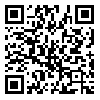Volume 17 - Supplement of 11th Annual Iranian Congress of Medical Ethics (Posters)
IJMEHM 2024, 17 - Supplement of 11th Annual Iranian Congress of Medical Ethics (Posters): 1-2 |
Back to browse issues page
Download citation:
BibTeX | RIS | EndNote | Medlars | ProCite | Reference Manager | RefWorks
Send citation to:



BibTeX | RIS | EndNote | Medlars | ProCite | Reference Manager | RefWorks
Send citation to:
Keshvari M, Farajzadeh N, Shahriari M, Azadmanesh M, Jamalinasab A. Ethical Challenges in Nursing and Midwifery Schools from the Perspective of Faculty Members: A Qualitative Study. IJMEHM 2024; 17 (S1) :1-2
URL: http://ijme.tums.ac.ir/article-1-6882-en.html
URL: http://ijme.tums.ac.ir/article-1-6882-en.html
Mahrokh Keshvari1 
 , Negar Farajzadeh *
, Negar Farajzadeh * 
 1, Mohsen Shahriari2
1, Mohsen Shahriari2 
 , Mohammad Azadmanesh3
, Mohammad Azadmanesh3 
 , Aliasghar Jamalinasab4
, Aliasghar Jamalinasab4 


 , Negar Farajzadeh *
, Negar Farajzadeh * 
 1, Mohsen Shahriari2
1, Mohsen Shahriari2 
 , Mohammad Azadmanesh3
, Mohammad Azadmanesh3 
 , Aliasghar Jamalinasab4
, Aliasghar Jamalinasab4 

1- Nursing and Midwifery Care Research Center & Community Health Nursing Department, Nursing and Midwifery School, Isfahan University of Medical Sciences, Isfahan, Iran
2- Nursing and Midwifery Care Research Center & Adult Health Nursing Department, Nursing and Midwifery School, Isfahan University of Medical Sciences, Isfahan, Iran
3- Master of Science in Community Health Nursing, School of Nursing and Midwifery, Isfahan University of Medical Sciences, Isfahan, Iran
4- Department of Nursing, Faculty of Nursing and Midwifery, Hormozgan University of Medical Sciences, Bandar Abbas, Iran
2- Nursing and Midwifery Care Research Center & Adult Health Nursing Department, Nursing and Midwifery School, Isfahan University of Medical Sciences, Isfahan, Iran
3- Master of Science in Community Health Nursing, School of Nursing and Midwifery, Isfahan University of Medical Sciences, Isfahan, Iran
4- Department of Nursing, Faculty of Nursing and Midwifery, Hormozgan University of Medical Sciences, Bandar Abbas, Iran
Abstract: (136 Views)
Nursing and midwifery professors play a crucial role in transmitting societal norms, providing cultural experiences, shaping students' behavior, beliefs, and attitudes, and cultivating moral virtues. As significant influencers on students' moral development during their academic journey, careful attention to this aspect is essential. This study aimed to elucidate the ethical challenges encountered by faculty members within the Faculty of Nursing and Midwifery. This qualitative study employed content analysis. Purposive sampling was utilized to select 23 faculty members from the Faculty of Nursing and Midwifery at Isfahan University of Medical Sciences, with data collection spanning eight months. Data were collected through semi-structured interviews and analyzed using conventional qualitative content analysis. Continuous and comparative data analysis revealed three primary categories of ethical challenges perceived by faculty members: discrimination and injustice, low professional commitment, and unprofessional behavior.
· Discrimination and injustice: This category encompassed three subcategories: disparities in rule implementation across faculties and groups, unfair financial compensation, and inequitable distribution of academic units and points.
· Low professional commitment: This category included two subcategories: educational underselling and non-adherence to established rules by faculty members.
· Unprofessional behavior: This category comprised two subcategories: unhealthy competition among faculty members and inappropriate student evaluations.
The experiences of faculty members in this study highlighted the presence of numerous challenges, with ethical issues significantly impacting their performance and motivation. The identified ethical challenges primarily revolved around discrimination and injustice, low professional commitment, and unprofessional behavior. Given the pivotal role of faculty members in teaching ethical principles and actively addressing ethical challenges, it is imperative for administrators and officials to acknowledge these concerns and implement strategies to mitigate these issues.
· Discrimination and injustice: This category encompassed three subcategories: disparities in rule implementation across faculties and groups, unfair financial compensation, and inequitable distribution of academic units and points.
· Low professional commitment: This category included two subcategories: educational underselling and non-adherence to established rules by faculty members.
· Unprofessional behavior: This category comprised two subcategories: unhealthy competition among faculty members and inappropriate student evaluations.
The experiences of faculty members in this study highlighted the presence of numerous challenges, with ethical issues significantly impacting their performance and motivation. The identified ethical challenges primarily revolved around discrimination and injustice, low professional commitment, and unprofessional behavior. Given the pivotal role of faculty members in teaching ethical principles and actively addressing ethical challenges, it is imperative for administrators and officials to acknowledge these concerns and implement strategies to mitigate these issues.
Type of Study: Ethics Congress |
Subject:
Congress of Ethics
Received: 2025/02/26 | Accepted: 2024/12/23 | Published: 2024/12/23
Received: 2025/02/26 | Accepted: 2024/12/23 | Published: 2024/12/23
| Rights and permissions | |
 |
This work is licensed under a Creative Commons Attribution-NonCommercial 4.0 International License. |



